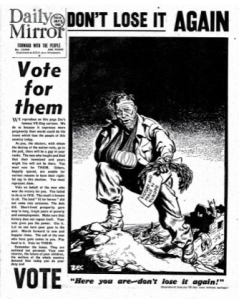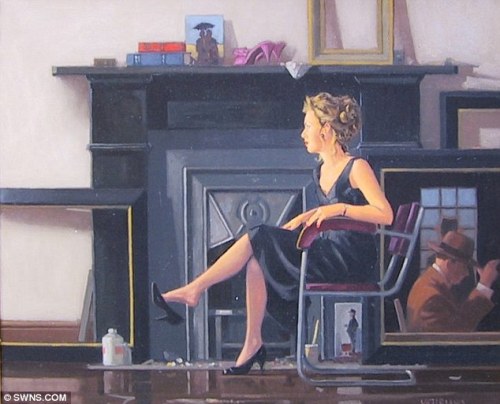I still like that Guardian graphic noted in the previous post. When I threw it into a Tweet, responding to John Rentoul’s self-advertising, it prompted two responses:
One, joking (I hope) that:
Surely, dear Issy, you mean Damien Hurst’s menials. The Great Man is far too busy cosseting his “$350 million” net worth (and thereby the richest living artist in all art history) to craft those expensive bullets. Apparently, while Hurst is definitively a real artist, Jack Vettriano (the people’s choice) “just colours in“.
The other was more specific:
So, I went to the very first Nuffield study, R.B.MacCallum and Alison Readman, The British General Election of 1945. A slim volume, 311 pages, and not (brag! brag!) the 1999 Macmillan reprint. Nor even the 1964 Frank Cass one. Yes, indeed, the original 1947 Oxford first-edition, complete with Collet’s of 66 Charing Cross Road (telephone Temple Bar 6306) sticker in front cover . So, beat that.
Lo and behold, Tim MacGregor’s suspicions are born out. And it’s racy stuff — the academic equivalent, perhaps, of Vettriano, who
fixes on fetishistic, stylish objects and paints them with a slick, empty panache.
The great day of 5 July dawned clear and fair. The newspapers with strong headlines urged the importance of the electors’ duty upon their readers; vote and vote early. ‘We are winning’ cried the Daily Express. ‘Churchill flays Morrison for “cowardly” speech’ said the Daily Mail. ‘To the Polls’, exclaimed the Daily Herald, ‘Victory is within your grasp. Vote early: vote Labour.’ The News Chronicle took an individual line and carried its readers’ minds to the most illustrious cradle of all democracy. ‘Plot to seize power in Athens. Greek monarchists are hoping for Tory victory.’ The Times informed its readers, ‘The Nation polls to-day.’ If any of the high elite who read it were still malleable enough to be swayed by its advice, they must have found themselves looking into a glass darkly. In a leading article called ‘Time to Vote’, it seemed to stand so far above party as to find the distinction between the contending factions almost invisible. In the first part it did indeed strongly censure Mr. Churchill for his flogging of the Laski issue and declared, ‘Let the battle with the Labour Party be fought out upon the true battle ground.’ Yet when the battle scene is surveyed it would seem to have been fought before the era of smokeless powder, so difficult is it to discern the opposing armies. In long and labyrinthine sentences it seeks to reduce to a minimum the issues which separate the parties.
Though each party will give the interpretation of the White Papers or other foreshadowings of policy a certain bias of its own, all parties are committed to them, and it will be hard for any one party, in view of its undertakings, to refuse collaboration in the main, whatever critical reservations it may have to make—which supplies yet another reason for regretting the deliberate whetting of animosities in the election and for looking for an early cooling of the atmosphere.
And again:
It calls for realistic and competent action by men who are not too much scared by foolish talk of totalitarianism to invoke, where it is indispensable, the unique organizing power of the state, nor shocked or alarmed by the benefits or rewards conferred on courage and imagination prompting personal initiative; and if the test be freedom, ‘You must organize to be free’.
Some high administrative wisdom may have lain in all these words, but it is vain, in an election campaign, impotently to deplore ‘the whetting of animosities’ since so much of the energy and skill of the participants is deliberately devoted to that end. There was more to be thought of than White Papers and ‘other foreshadowings of policy’ which were liable to be given ‘a certain bias’. Indeed it was this ‘certain bias’ which was the all-important issue in the election. An election is a contest, and men do not contend about what they agree upon. Men are disputatious animals by nature and politics is a manifestation of their love of dispute. The Times, as we have seen, deplored the break-up of the Coalition Government. But it had not broken up for nothing, as was proved by the combative enthusiasm of the Blackpool Conference. Government is of men as well as of measures and the nation was asked to choose between very different teams of men. Still more, politics is a matter of what people feel and think about both measures and men. It is of the utmost importance that this or that policy be undertaken by one or other set of leaders filled with the spirit and ideals of their supporters, exalted and confirmed by recent electoral victory. The Times appeared to have studied the election while omitting to take account of the principal factor in it, political sentiment. From this point of view it could be said that it was not taking the election seriously.
 Not far from Printing House Square, in Fetter Lane, the writers of the Daily Mirror had no false shame about ‘whetting animosities’. Domestic tragedies with a political import, not obscure in its significance to the minds of writers and readers, were blazoned in headlines on the election morning. ‘Says they must give up unborn baby. They can’t find home.’ ‘Wife and D.C.M. husband room two miles apart—Grandma has rest of family.’ ‘Married woman with already two children and expecting baby in two weeks wants it adopted to get it a home. A strange world!’ And on the front page in staggering head-lines was the familiar exhortation, ‘DON’T LOSE IT AGAIN. VOTE FOR THEM.’
Not far from Printing House Square, in Fetter Lane, the writers of the Daily Mirror had no false shame about ‘whetting animosities’. Domestic tragedies with a political import, not obscure in its significance to the minds of writers and readers, were blazoned in headlines on the election morning. ‘Says they must give up unborn baby. They can’t find home.’ ‘Wife and D.C.M. husband room two miles apart—Grandma has rest of family.’ ‘Married woman with already two children and expecting baby in two weeks wants it adopted to get it a home. A strange world!’ And on the front page in staggering head-lines was the familiar exhortation, ‘DON’T LOSE IT AGAIN. VOTE FOR THEM.’



